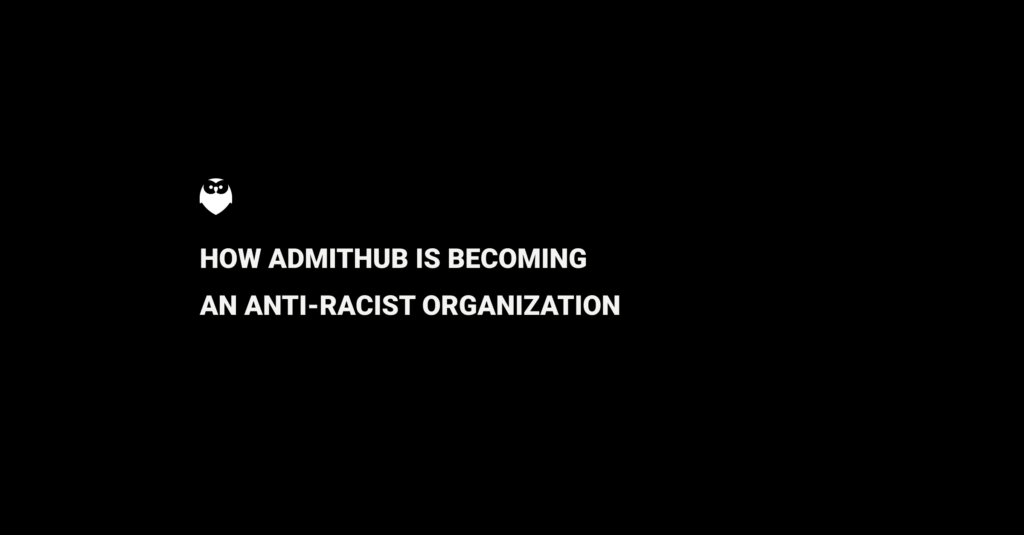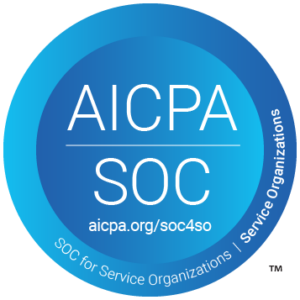Since June of 2020, AdmitHub has been actively working to understand what it means to be anti-racist. As an organization that works with colleges and nonprofits around the country on issues of access and student success, we have so appreciated the chance to support our partners’ efforts to build a more equitable higher education system. We also recognize the importance of ensuring that the work we do externally is matched by a commitment to improving internally.
Throughout the past year, we have begun to practice the willingness and ability to confront bias. In moving toward our ultimate goal of becoming an actively anti-racist organization, we picked multiple starting points; some which didn’t work out at this time although we’re committed to revisiting at a later date, and some which we have steadily built upon. We still have much to learn and do, but we are also encouraged by the work our entire team has put in. Here is where we are one year later in our organizational journey
AdmitHub’s First Steps Toward Becoming Anti-Racist
During that period of reflection, we identified the following commitments (verbatim) to regularly practice as we worked to understand this path of becoming an anti-racist organization:
- Learning: Invest in and offer ongoing education around all topics related to diversity, inclusion, and equity.
- Culture of Belonging: Provide organizational support for employee resource groups (ERGs).
- Hiring: Reduce bias through a structured interview process, invest in diversified pipeline sources, ensure all employee referrals are culture adds (not just culture fits).
- Hiring: Only actively recruit/reach out to BIPOC candidates for all roles starting now.
- Measurement: Launch an annual inclusion survey starting in 2021.
Even at the time, we knew this list was incomplete and imperfect (you might agree!). Taking those early steps helped us not only begin to “walk the walk”— it also enabled us to see where there were gaps, understand where we had to commit to more, and provide space to receive feedback.
Before we share what we are committed to for 2021, we want to hold ourselves accountable to the impact and results from our initial work.
1. Learning:
We invested $20,500 in one-time and ongoing educational opportunities to identify bias, opportunities for interventions and build a culture of open honest and direct conversations around these topics:
- We hosted an anti-racism panel discussion with outside facilitators.
- Everyone in the company (at the time) participated in a workshop focused on understanding diversity, inclusion, and equity, in partnership with Visions, Inc. a non-profit training and consulting organization specializing in diversity and inclusion. The sessions were rated a 4 on impact and usefulness (out of 5) by members of the AdmitHub team.
- Specifically, we heard that people found value in the small group conversations, sharing quotes like:
- “I will work to better understand/learn other’s experiences. This will benefit me as I grow as a manager and learn to interact with my direct reports.”
- “There was conversation that would likely not have happened in the day to day, with colleagues I usually do not interact with. The workshop and breakout groups specifically, highlighted how some people never really have to think about the ways identity with non-excluded groups can be linked with advantages and how identity with excluded groups can lead to disadvantages.”
- Specifically, we heard that people found value in the small group conversations, sharing quotes like:
- We launched a partnership with Crescendo, a platform for micro learning to support building actions and inclusion at work, that enables us to regularly share and discuss content related to diversity, inclusion, and equity.
2. Culture of Belonging:
- Employees who identified as BIPOC formed our first Employee Resource Group with a $5,000 budget to spend on events, donations, contributions and other supportive events. (And they’ve helped hold us accountable to sharing this public statement!)
- We built a culture of giving in the wake of George Floyd’s murder and sustained it throughout the rest of the calendar year, contributing over $25,000 as employees and a company. Specifically giving to organizations related to Social Justice. (Our employees contributed more than half of that total)
3. Hiring:
- For the 26 hires we made after July 2020, we followed a structured interview process which included trait-based interviewing, diversified interview panels and updated job descriptions removing a college degree as a requirement and incorporating inclusive language.
- We began building relationships with Hack.Diversity, Techeria, Out! In Tech, The Hire Black Initiative, and other hiring groups that build community for historically underrepresented talent. These relationships supported our shift in sourcing strategy.
- We updated our employee referral guidelines to include direct language about the bias that exists in employee referral programs.
- We have only sourced candidates who identify as BIPOC, or those who are historically underrepresented in tech roles, since July 2020. (We have also continued to accept inbound job applications, which accounts for the numbers listed below.) We know that Boston Tech is demographically largely male and largely white. By focusing all of our sourcing efforts on historically underrepresented and BIPOC candidates we knew we would improve our pipeline through diversifying it.
- From Jan – July 2020 we hired 10 people, of which 10% were BIPOC candidates and 50% were women.
- From July 2020 – Dec 2020 we hired 27 people, of which 33% were BIPOC candidates (4% did not disclose) and 56% were women.
4. Measuring Impact:
- We recognize that we need to not only “do the work” but also ensure we are measuring impact. With that in mind, we’ll utilize our current relationship with CultureAmp to launch an Inclusion survey in 2021 to measure both the work we’ve done to date, and the work we still have left to do.
- We also utilized our current pulse and engagement surveys to check in on our initial work. Team members’ agreement with the statement “AdmitHub is committed to being anti-racist” went up by 23 points quarter-over-quarter. This is a good start.
What’s Next for AdmitHub’s Journey to Become Anti-Racist?
We recognize that our journey to become anti-racist has just begun, and there is a lot of work still to do. That’s why we’re continuing to look forward and commit to taking more steps every year.
A learning from 2020 is that we have to look beyond training and hiring and do more work to ensure we are building a truly inclusive culture, both by our actions as a company and our work to build inclusive products and services that meet our partners’ and end users’ needs.
For 2021, we are committed to expanding upon the work we’ve done, sharing action plans, continuing to diversify our team, providing paths to more representation in leadership, and beginning the work of moving our efforts to our core business, products, and services.
In 2021, AdmitHub is committed to enhancing our anti-racism work in several areas of the business. In an effort to make that commitment transparent, we’ve listed a set of specific actions and activities below.
When accounting for all of our commitments to anti-racist practices, this will now amount to 70% of our People Operations budget.
- Learning:
- We will invest in and offer ongoing education and open dialogue opportunities around all topics related to diversity, inclusion, and equity.
- We will continue our partnership with Crescendo and outside facilitation companies.
- We will offer platforms for a variety of conversations related to anti-racism and diversity, inclusion, and equity.
- We will invest in and offer ongoing education and open dialogue opportunities around all topics related to diversity, inclusion, and equity.
- Culture of Belonging:
- We will build an inclusive culture where all employees can see and are given equitable access to success.
- We will continue to support our Employee Resource Groups (ERGs).
- We will add additional ERGs as requested when an employee group is interested.
- We will assess and address pay equity and gender representation at all levels of the organization— including creating paths for women and colleagues from historically underrepresented backgrounds to leadership roles.
- We will continually measure ourselves, and report out on data and action plans to ensure progress.
- We will build an inclusive culture where all employees can see and are given equitable access to success.
- Hiring:
- We will build an employer brand that is recognizeable as being committed to being an anti-racist organization.
- We will be more public about our commitments.
- We will continue to partner with external organizations to build that brand, and ensure our leadership and hiring managers are also building those relationships.
- We will continue to only source historically underrepresented candidates for all roles.
- We will increase our top-of-funnel numbers for candidates from historically underrepresented backgrounds (application/sourced) by 20% year over year.
- We will increase our top-of-funnel numbers for candidates from historically underrepresented backgrounds (application/sourced) by 20% year over year.
- We will build an employer brand that is recognizeable as being committed to being an anti-racist organization.
- Products and Services:
- We will ensure we are building products and services that are inclusive.
- We will extend our commitment of internal success to our users.
- We commit to an internal assessment and take action related to our tools and services, and we will publish our actions and outcomes.
- We seek to develop an HBCU consortium to better understand the needs of these institutions and their students.
- We will ensure we are building products and services that are inclusive.
We welcome all conversations about our actions, outcomes, and future plans. We welcome the opportunity to be challenged – both by our team members, by our partners, and by our communities – to do more or differently. We welcome curiosity and engagement about why we chose some paths, and why we steered away from others. And we welcome you to raise your hand and join us on this journey. We publish this statement because we want to ensure every candidate we speak with is also up for taking this journey with us.

